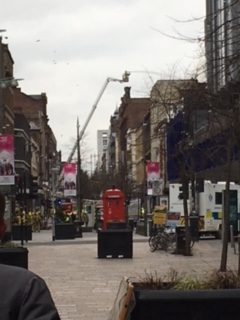Denise Christie explains the strategic approach to building from the workplace up
2018 saw the FBU celebrate 100 years of existence (see Scottish Left Review, September/October 2018) and we are proud we have sought to build a campaigning and democratic union specifically for our service – the Fire and Rescue Service (F&RS). We continue that tradition today by organising across all sections of the workforce, across all duty systems and in all roles.
The FBU is a democratic union, where members retain full sovereignty over the key decisions and direction of their organisation. Our goal is to ensure the continued existence of an independent firefighters’ union, run by those within the service now and for the future and remaining a sectoral-specific union. We are the best defence firefighters have for pay and conditions, health and safety, pensions and fair promotion, and all matters relating to the profession. We are the best guarantor to win improvements in all aspects of firefighters’ work. But we recognise that we have suffered from more than a decade of savage austerity cuts to the F&RS. This has cut the workforce by 15% in Scotland with obvious impacts on our membership. The pay cap has meant that FBU subscriptions have not increased significantly as subscription increases mirror pay percentage increases.
It has long been the aim of the FBU to organise all those workers within our sector. Yet, this immediately raises the question about how we define the sector. For many years, this appeared a straightforward matter and the union’s rules previously limited this to those working under National Joint Council (NJC) conditions of service. However, problems have increasingly appeared as the structure of our service has changed. One problem with such an approach is that any worker or group of workers whose employment or conditions of service are removed from the auspices of the NJC would no longer be eligible for membership. This has already been the situation in a number of cases and as a result we have amended our rules in an attempt to take account of such cases, albeit seeing them as exceptional circumstances.
We recognise the challenges in recruiting members and have reacted by broadening the scope for FBU membership to reflect the changing service in which we work. This marks a shift towards organising more as a sector-specific union allowing the FBU to determine the definition of the service which we seek to organise. The new rules allow us ‘To organise all those employed in the provisions of
firefighting, rescue or related services’.
An example to demonstrate why such a shift was necessary is that through the F&RS there are posts that were previously filled by uniformed FBU members on NJC conditions, but have been downgraded and removed from NJC conditions i.e. these were previously identified as firefighter jobs but are no longer considered as such. 
The workplace branch has been essential to the building and development of the FBU. Its role is enshrined in our rule book. It is the basic building block of our structure which enables workers to organise themselves democratically within the workplace. Ensuring the health and viability of our workplace branches is, therefore, essential for our future. New educational support, including FBU ‘taster’ sessions have been developed in order to encourage the participation of members in the FBU structure starting with the branch. Building, strengthening and developing our branches is crucial to an effective organising strategy.
The FBU has a strong tradition of workplace organisation although we cannot afford any complacency. But we must also recognise that a high density does not always guarantee a high participation union. Our education programme is progressing from transactional to transformative – to move from the individual to the collective and encouraging officials to be critical thinkers and agitators. A move that is proving to be effective in the recent campaign wins the union has had.
The wider issues facing our movement pose a double threat to the FBU. If our own level of workplace organisation declines it would inevitably be reflected in the wider involvement of our members in our campaigning activities and would inevitably weaken our political, campaigning and bargaining positions. Equally, if workplace unionism continues to decline across the movement it is difficult to see how the FBU can avoid suffering at least some of the consequences. We need to explain to members that when we support other groups of workers – whether blacklisted construction workers or low paid cleaners fighting for union recognition – we are securing our own future too.
One of the most important areas of organising is campaigning. The FBU is constantly campaigning on behalf of members of the F&RS. It is vital members understand what the FBU is campaigning for. The key to the organising approach is encouraging members to take part in union campaigns. It means keeping them well informed and up-to-date on all union issues. Our most recent campaign has been to highlight the cuts to the Scottish F&RS, including the loss of nearly 1,000 frontline firefighters’ jobs. The union encourages firefighters to get involved in the campaigns and we provide briefing packs for our members in order to support political lobbying. But all this must be done in solidarity with others in the labour and union movement. The issue of maintaining, defending and developing workplace unionism and how such an approach fits with the fight against austerity and privatisation should include joint educational initiatives, campaigns and conferences if we are to truly learn from each other’s experiences.
Denise Christie is the Scottish Secretary of the Fire Brigades Union.